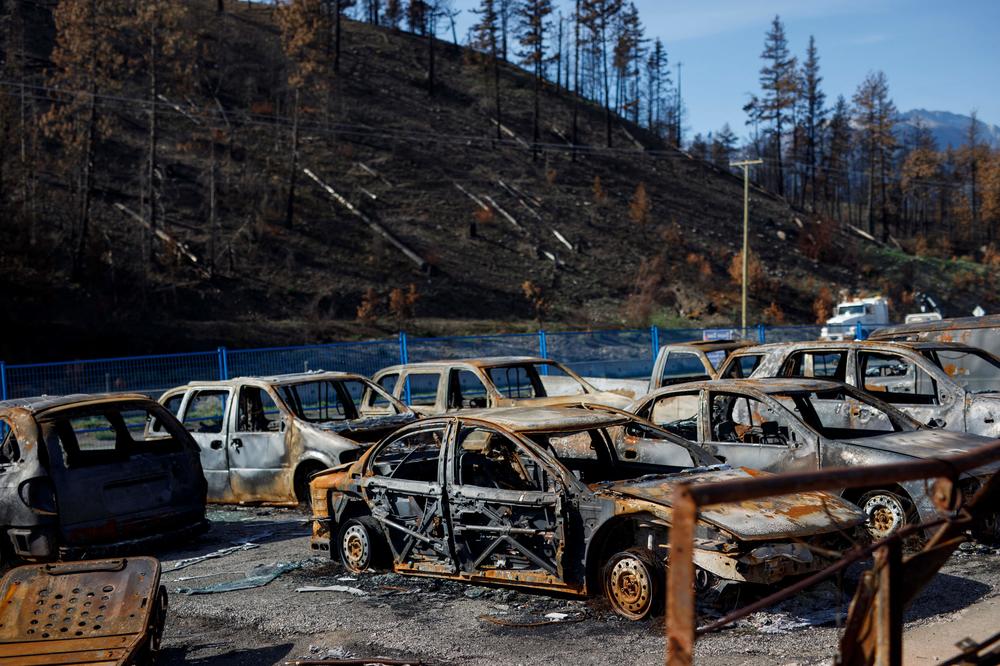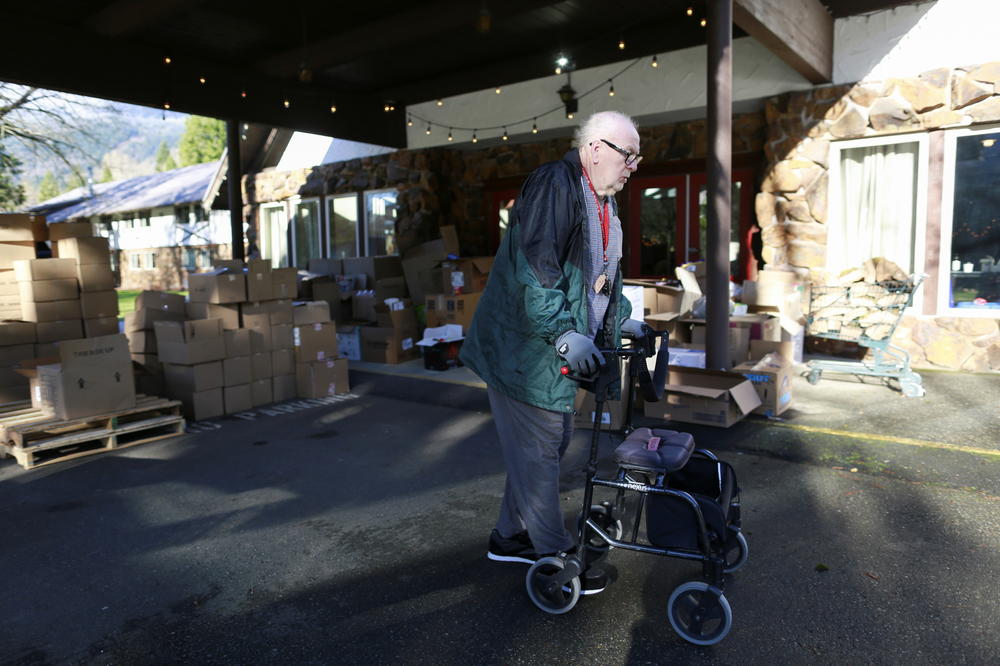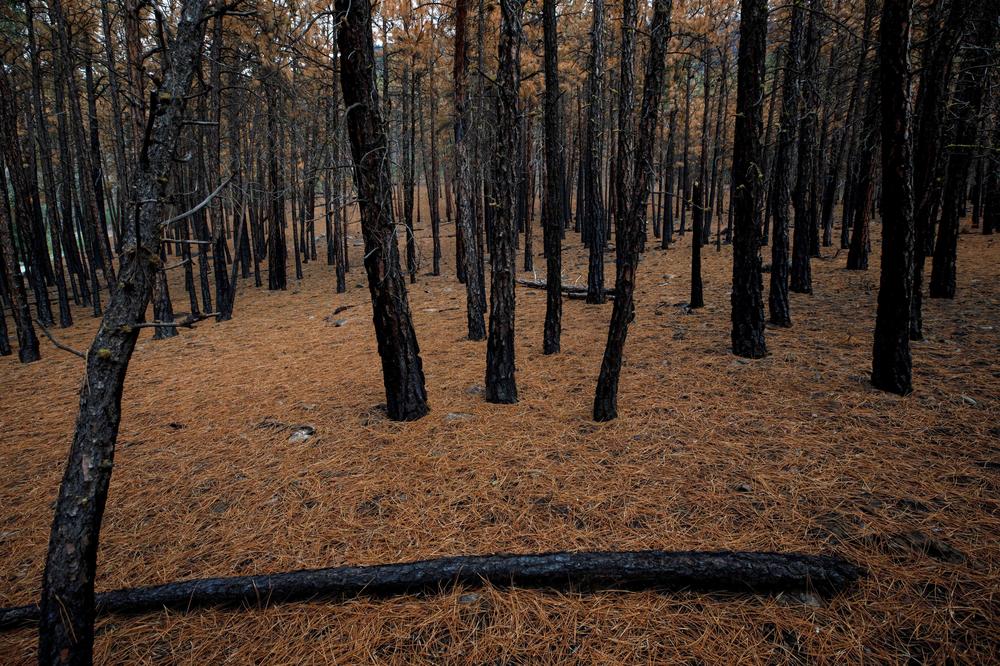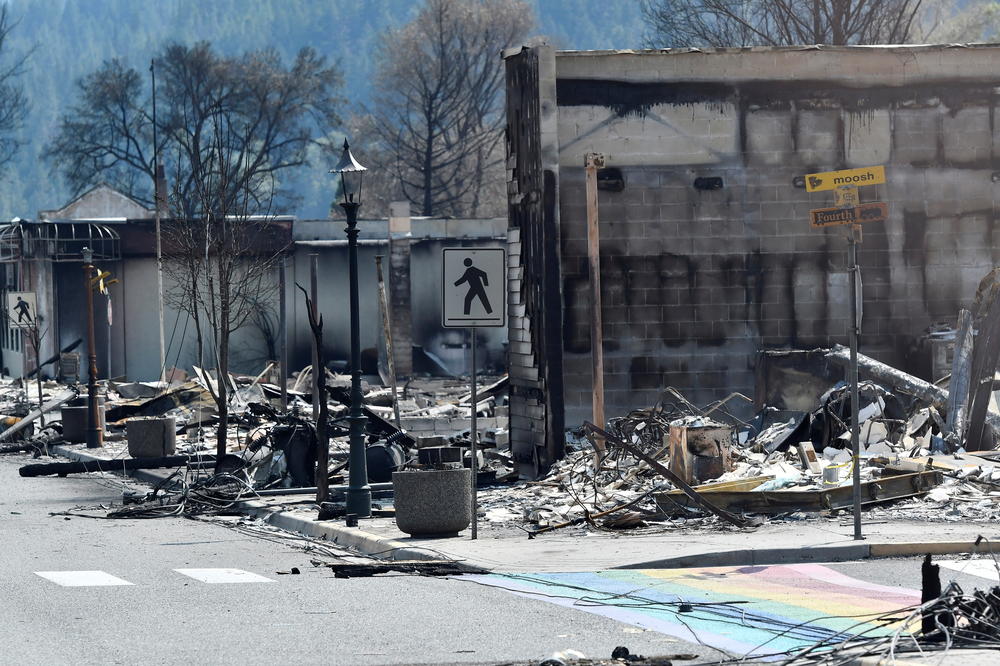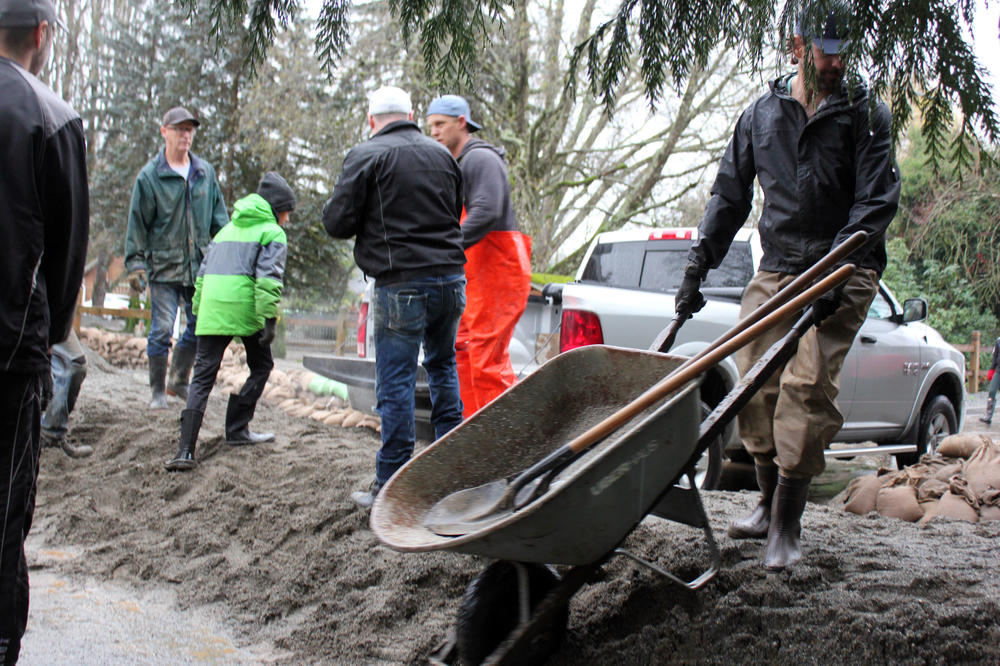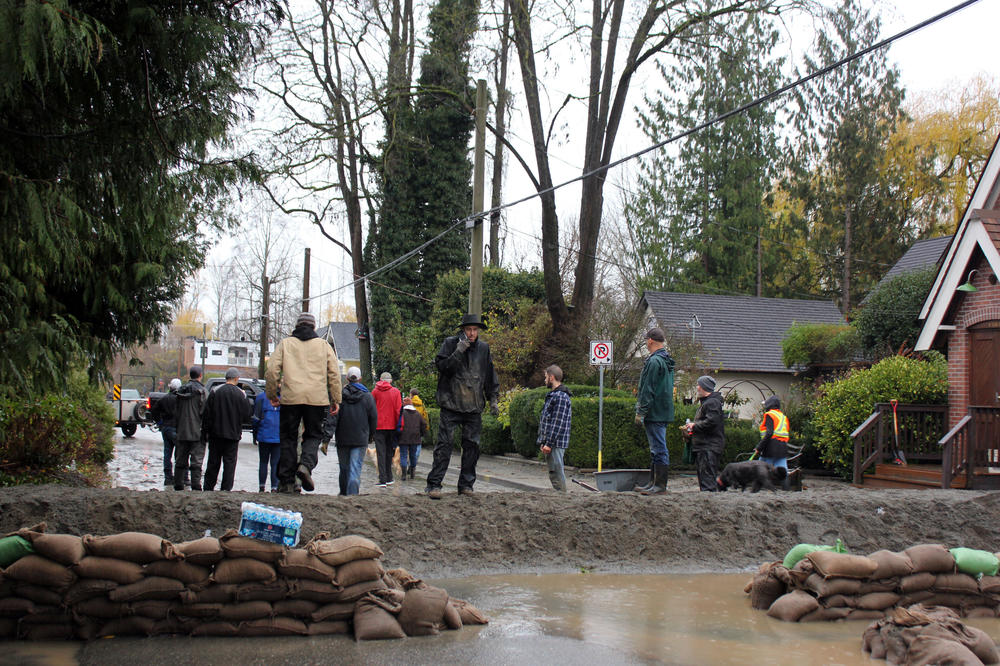Section Branding
Header Content
A church retreat came to the aid of Canada's latest disaster survivors
Primary Content
HOPE, British Columbia — A little before dinnertime, people trickle in to sit by the fireplace in the main lodge of Camp Hope, a church retreat center at the foot of forested mountains in this western Canadian province.
They recount how, in late June, a wildfire suddenly sped into their town of Lytton, British Columbia, about 60 miles north.
"It was just a big cloud of like a brown smoke that's creeping up the mountainside there," recalls Alphonse Adams, who belongs to the Indigenous Lytton First Nation.
"Then after that, I guess that wind picked up there, plus the heat and that start coming toward the village there," he says. "I don't call it a town. It's a village. Now, it's not."
British Columbia has experienced a series of natural disasters this year, which scientists say show the intensifying effects of climate change on everything from wildfires to heat waves to mudslides.
This summer, a heat dome shattered Canada's temperature records and is blamed for hundreds of deaths. Last month, an "atmospheric river," a current of wet, warm air from the tropics, dropped a normal month's-worth of rain across the southern part of the province in just two days. The record rainfall caused flooding and landslides across a wide area.
Canadians who experienced these intense weather events have passed through Camp Hope, starting with the Lyttonites, whose town burned just days after setting an all-time temperature record for Canada during this summer's heat dome, reaching 121 degrees. Two people died in the blaze.
It was a long stretch of being homeless
Dave and Doreen Crozier had retired to Lytton 15 years ago. The fire reached their home just after Doreen ran back inside to try to grab wallets and passports.
"Luckily," says Dave Crozier, "I seen her rushing out with a cat in a basket and it was too late to get our other possessions. The fire engulfed the house by then."
The Croziers stayed with each of their children for a few weeks, before they learned Camp Hope, which is run by the Seventh-day Adventist Church, had canceled its summer reservations to house residents of Lytton. Some have since moved on to other temporary accommodations closer to friends or family. The Croziers have remained on, with their cat.
"The only thing I got out of the house. I'm keeping her," Doreen Crozier jokes.
"Other than that," says her husband, "this has been a long stretch of being homeless."
A new crisis was on their doorstep
Camp Hope, he says, "has been a great rescue in the dark," and not just for residents of Lytton.
Those displaced by the wildfire recently found themselves helping travelers trapped overnight on a highway that runs by the camp, after torrential downpours caused multiple landslides.
By the morning, the Croziers and a member of the camp staff had gone down to knock on car windows and invite the passengers in to eat and get warm.
"You could see the stress in people's faces that had slept with their children out there on the street on that Highway 7 all night. That was pretty scary to see them in that condition," says Dave Crozier.
One of the drivers, Samantha Brownlee, says she hadn't realized how many people had been stranded until she walked into the lodge. On her way home from seeing her parents, she had just spent a cold night in the car with her kids, ages 7 and nearly 2.
"This wonderful human, named Karen, just spots me in the middle of this dining room, and I'm grabbing Cheerios for the boys. And she says, 'Do you need diapers?' And I think my eyes must have grown like three sizes," says Brownlee.
A transformation prepared the camp for its latest visitors
Camp Hope has gone through some changes since the Lyttonites arrived. Volunteers now prepare three meals a day. The camp had a room full of donated toiletries and clothes, which they offered to the stranded travelers.
"We just settled into a couch. And we were surrounded by people. And we just started talking, you know, because there was nothing to do," Brownlee says. She soon realized that some of the people around her, including the woman who offered her kids fresh toothbrushes, were from Lytton, and that they lived in the lodge. Brownlee was astonished by the abundance of supplies for hundreds of unexpected visitors.
In all, the camp welcomed 271 stranded travelers. It would take several days for crews to clear the highway.
"We set up beds in the auditorium," says staff member Evie Connor. "We had a ton of mattresses that we brought in from our cabins and stuff in the auditorium and then they found every nook and cranny — I'm still finding mattresses in places I would never know that they would be."
Without road access, food eventually had to be flown in by helicopter for all the unexpected visitors. Connor says some of the temporary residents helped unload deliveries and in the kitchen.
Relatives of Brownlee, who was stranded with her children, were able to hire a helicopter to fly them out after several days at Camp Hope. She says it was strange to be leaving to return to her normal life knowing those from Lytton would stay.
"We were lucky enough that it wasn't a long-term shift of our entire futures," she says. "I've talked multiple times now with the director of Camp Hope, to just try to ask what are ways we can show support? ... What are your plans for Christmas?"
A series of displacements follows extreme weather in British Columbia
Sarah Sheffield, who also got stuck on the highway with her husband and their dog, says that since getting home, she has joined a group assembling supplies for people whose homes flooded during the same storm.
"This really made me realize how much it means to somebody who's going through something difficult to have people there," she says of her experience at Camp Hope.
At least 17,000 people were ordered to evacuate last month across multiple municipalities affected by floodwaters. Some still have not been able to return home.
Scientists, public officials and many residents of British Columbia have linked this summer's heat and wildfire season and the recent storms to the intensifying impacts of climate change on the region's weather.
The fire cost tens of millions of dollars in damage in Lytton. The federal and provincial governments have pledged money to rebuild the village, but it's slow-going. For now, the remaining Lyttonites have no departure date from Camp Hope.
Camp Hope anticipates a future role in disaster relief
The retreat's director, Bill Gerber, was cut off from the camp by the landslides in the nearby city of Abbotsford, which saw major flooding during the record rain events. He says he expects the camp could house disaster victims again in the future.
"These super hot, super dry summers in B.C.'s, it's in essence, just a tinderbox. We have so, so much forested land," he notes. "Up until now we always thought it was a blessing, to have our rivers and our streams and our lakes and our forests, and our lumber supply, and the natural, rugged beauty and all the mountains. But all of a sudden, it's like, I don't know, maybe almost, the blessing, it's a curse for a little while, right?"
The camp had just gotten a phone call from someone in emergency management for the province. More heavy rain was on the way. If there were more mudslides from the saturated mountainsides, could they be ready to accept more travelers?
Copyright 2021 NPR. To see more, visit https://www.npr.org.
